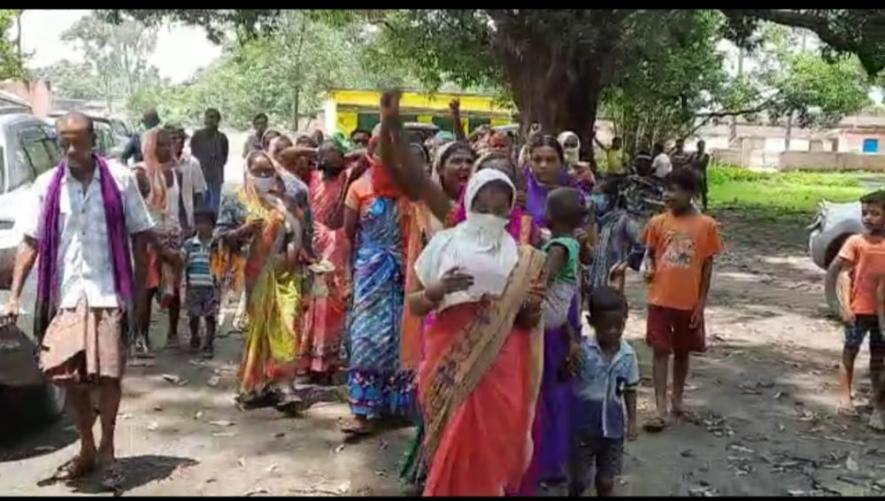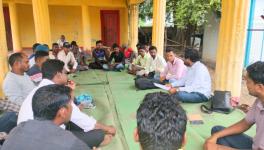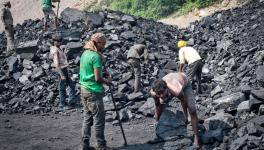Chhattisgarh: Protests Against Sponge Iron Plant in Jashpur by Tribal Communities Continue

Image Courtesy: Munaadi
As India struggles to find the path back to economic growth with the COVID-19 pandemic seemingly easing out, large-scale protests have been raging in the village of Tangargaon in Kansabel tehsil, Jashpur district of Chhattisgarh, against a sponge iron plant.
The plant, owned and operated by Maa Kudargarhi Energy And Ispat Private Limited, is to be set up to produce 0.462 MTPA (462000 TPA) of sponge iron, 0.52 MTPA (520000 TPA) of billets, and 70 MW of electricity. Adivasi communities in the area have been opposed to the plant, owing to the large-scale environmental damage it would do and the pollution it would cause, they said. Villagers from ten nearby panchayats have mobilised themselves against the upcoming environment clearance hearing for the project, scheduled for August 4. The residents have vowed to stop the hearing owing to the large-scale “faking of consent” that has allegedly taken place. A PIL has also been filed in the Madhya Pradesh High Court with the court issuing notice to the state government, Collector and other parties and seeking answers.
The issue has triggered a larger discussion in the state about the pollution caused by sponge iron industries and their effects on the environment and tribal communities.
Sponge iron is also known as Direct Reduced Iron (DRI). Direct reduction is an alternative route of iron making developed to overcome some of these difficulties of conventional blast furnaces. The Central Pollution Control Board (CPCB) had classified sponge iron as a red category industry which denotes its high potential to pollute. The classification means the industry needs strict pollution norms and guidelines and should be monitored and inspected regularly. However, studies by the Center for Science and Environment have showed that the regulatory framework fails in such cases on most occasions.
“Over 600 people have recently written to the collector again. There have been large-scale protests in the region. Past experiences of sponge iron factories have shown they led to skin allergies, enormous coal fly ash and respiratory problems. The water, forest, land and air will be polluted. The smoke, ash and other residues emitted from the factory will pollute all of it. Farming will be ruined. Public life and wildlife will be affected. The talk of employment for the local people is not true," Father Jacob Kujur told Newsclick
“We don't need iron or power; we need agriculture and forest produce-based industries. There should not be a factory that destroys agriculture and forest produce. We need an industry that keeps the environment clean," he added.
Villagers say the plant will adversely affect the fields and livelihoods of the Kanwar and Oraon tribes which call the region their home. In a bid to resist the plant, residents from multiple villages had staged protests this month on July 21.
Jashpur district falls under the Fifth Schedule Area – the land being transferred to the industrial firm has not received the gram sabha consent yet. Activists alleged that the process of land acquisition was done secretly and that Forest Rights Act (FRA), 2006 has also been violated.
Alok Shukla from the organisation Chattisgarh Bachao Andolan told Newsclick that the "company claims that they have purchased 80 acres of land from an individual family in the region to set up the plant – since its private land the acquisition process has not been followed. However, keeping in view the impact of the industry and given that it comes under the most polluting category, a gram sabha consent was needed, which has not happened. The movement against the sponge iron industry in Chhattisgarh is not new. What is important to understand is that when the state of Chattisgarh was carved out, enormous protests between 2005 and 2007 against this extreme pollution rocked the state. Owing to the movement the industry was discouraged and several MOU’s were also cancelled. However, now, amid this new wave of industrialisation by the Baghel government, all previous commitments have faded as promises to re-open this dangerous and widely polluting industry are being made," he alleged.
The petitions and protests have also highlighted that the area is home to an elephant corridor, medicinal plants, forest area as well as wildlife, which will be affected by the industrial activity in the region. The ground-water level of Jashpur district is also dangerously low, according to the Central Water Commission. If the plan for the plant moves on the residents feel that it will also turn into another cause for water problems for this area. Maa Kudargarhi Energy and Ispat Private Limited will use water from the Maini river and the risk of it being polluted also figures.
Since 2002, India has been the largest producer of sponge iron. About 20% of the sponge iron produced worldwide is made in India. The firm and the state government states that the project will give a boost to the economy of the state by way of direct and indirect taxes, employment and infrastructure development. The company has also promised the generation of 2,000 jobs on a daily wage. However, Chhattisgarh has witnessed protests against sponge iron plants since the time the state was carved out. The manufacturing process releases extreme heat and smoke containing oxides of sulphur and carbon, unburnt carbon particles and silica.
“These plants, which have come up mostly in tribal villages, don't add much to the local economy either. Despite initial assurances of job security, few local villagers have been hired. Given that most villagers lack adequate qualification, those that do get jobs are usually hired as unskilled labourers with no insurance or medical benefits. This way, factory management ensures there's less trouble from local residents, especially in case of accidents," Down to Earth had observed.
Get the latest reports & analysis with people's perspective on Protests, movements & deep analytical videos, discussions of the current affairs in your Telegram app. Subscribe to NewsClick's Telegram channel & get Real-Time updates on stories, as they get published on our website.
























